Happy May 1st and happy May issue of @thecalendarmagazine. We’re fully in the mood to embrace the new post-lockdown freedoms awaiting us and have so much to share with you in the month ahead. We’ve found the best summer ‘dress-up’ frocks with sustainable credentials that you’ll want to wear for your opened-up social calendar, as well as the brands you need to know now. And if you’ve ever wondered what the new trend for bar soaps is all about, allow our resident beauty expert @annasolowij to enlighten you. Our travel editor @swdavies shows you the best eco destinations to put on your wish list, from rural Majorca to coastal Mexico, and we’ve got the inside track on three of our favourite designers: @maggiemarilyn, @connerives and @stevenstokeydaley, from fashion features editor @evjsells. All of this alongside a whole host of other inspiring ideas and people to help you be in the now, fashion the future and get your summer season off to a wonderful start. Stay tuned and enjoy!
Anne-Marie Curtis. Editor-in-Chief, Calendar



Calendar Travel
On the prized UK green list, and planning to open to tourists by mid May, Portugal is one of the top destination searches on Google at the moment. But rather than heading for the tourist hotspots in the Algarve, our sights are set on the rural, unspoilt region of Alentejo, southern Portugal – all whitewashed villages, cork fields and olive groves. Lisbon lawyer/wannabe farmer Pedro Franco Pinta bought nine hectares of land here 10 years ago, slowly and sustainably creating Craveiral Farmhouse as a very different kind of eco retreat, with the aim to have a positive impact both environmentally and culturally, and help people reconnect with nature. Now, 38 cottages, surrounded by forest and fruit trees, house the guests, with four swimming pools, a wellbeing area, an educational farm, and a rotating artists’ residency programme.
Rainwater is collected and filtered, organic waste is reused, and only old trees that need to be cleared fuel the wood-burning stoves. The restaurant is headed up by Michelin-starred chef Alexandre Silva, who aims to source 70% of ingredients from Craveiral’s own orchard and farmland. Their social mobility project, Craveiral Pizzeria, trains local young people with autism, Asperger’s and Down’s syndrome, with some of the restaurant’s profits donated to their Associação Vila charity.
You could just chill by the pool, ride Craveiral’s horse, try a yoga class or borrow quad bikes or a 4X4 to go surfing on the spectacular beach of Zambujeira do Mar, about 15 minutes away – but that would be missing the point. If you want to make it more than just a regular holiday, volunteer on the farm, feed the animals and help out in the orchard and vegetable gardens, and you will get the very best of both worlds.
Craveiral.pt; cottages from €160, room only.
Getting there: take the train via Lisbon to Santa Clara-Saboia, 30 mins from Craveiral.
If you fly to Lisbon, offset flights with itmustbenow.com, which is B Corp-certified (i.e. the gold standard).





Be In The Now
When creative minds converge and collaborate, wonderful things can happen. Cue: Matches Fashion and Helium London, who have come together to create an exclusive exhibition and one-off auction entitled ‘Pressing Matters’. Curated by Pavement Licker, the resulting artworks see leading contemporary artists create unique pieces from test pressings and vinyls from some of the biggest names in the music industry. From Gavin Turk and David Shrigley to the Rolling Stones and Charli XCX, this is a collaboration that you won’t want to miss. Launching on the 4th of May through to 29th May, the exhibition will run at Matches Fashion’s townhouse 5 Carlos Place, with an online auction at www.heliumlondon.com. All money raised will be in aid of Music Support – the grassroots charity offering help and support for those in or employed by the UK music industry, affected by mental ill health and/or addiction. Good deeds all round.

In Conversation With
We’re delighted to welcome Jane Shepherdson CBE, fashion industry veteran, former brand director at Topshop and chief executive at Whistles, and now chair of rental platform My Wardrobe HQ, as our first In Conversation guest with Calendar founder and editor-in-chief Anne-Marie Curtis. We’ll be sharing content over the month on our IG stories, so head there to hear Jane’s thoughts on how you can make your wardrobe more sustainable, the joy of resale and why rental is the new high-street fix. Full interview coming up soon on IGTV.

Object of Desire
When a pair of earrings looks this good and is also underscored with solid conscious credentials and sustainable ethos – well, what’s not to love? LA-based jewellery brand Melissa Joy Manning’s beautifully crafted heirloom pieces are made by a community of skilled artisans dedicated to supporting domestic handmade production, and each piece is made from 100% recycled metals sourced from a refinery with the highest environmental standards. The brand also has a strong commitment to philanthropic endeavours and has partnered with a range of charitable initiatives, including Food Bank For New York City and the Clean Water Fund. We’re particularly taken with these earrings handmade from 14-karat recycled gold and Tahitian pearls that are guaranteed to elevate any look for the long haul, but there is a host of delights to choose from, and you can shop safely knowing you are investing in a piece with true purpose and a mission to fashion the future. Recycled gold pearl earrings, £710, available from net-a-porter.com

Love Forever
We’re so thrilled to welcome Laura Bailey, model, photographer and contributing editor at British Vogue as our May ‘Love Forever’ guest. Laura is wearing her treasured vintage Chanel jacket, given to her by Karl Lagerfeld 20 years ago, and says of her forever piece:
“Most of my wardrobe is vintage – my favourite pieces either scavenged in markets and charity stores or cherished and loveworn over the years. My classic Chanel little black jacket, given to me by Karl Lagerfeld 20 years ago, is as special now as it was then. The piece I’d save in a fire or for my daughter, and that I wear with anything – from my favourite old Levi’s to a mini skirt or a gown. Timeless and chic – and loved forever.”








The Calendar Edit
After a year of shoulders-up, Zoom dressing, we’ve been enthusiastically anticipating the return of full-length outfits. And with warm weather already approaching, we’re turning our attention towards our search for the ultimate summer dress.
The styles in this selection all have the ingredients of a timeless summer classic: midi or maxi length, with a vintage-inspired shape and joyful printed fabric. Whether you’ll be staying local or realising your summer plans elsewhere this year, one thing is certain: the perfect dress will always help.
Every piece in this Calendar edit has a slow-fashion slant, with vintage, pre-loved and sustainable first-hand options all thrown into the mix. From feminine florals to wholesome gingham, each has a twist that makes it slightly different from the next. Whatever your wardrobe, we hope you’ll find your perfect fit. HB.
Photo by @gilles_bensimon

Be In The Now
The ultimate rest and relaxation inspiration, courtesy of visual artist @jillburro_w

Be In The Now
Weekend inspiration courtesy of Frida Kahlo. Be your own muse.
Brand We Love
Inspired by Louise Bourgeois, Rentrayage takes its name from a French word meaning ‘to make whole again’ – a raison d’etre that permeates every aspect of the brand’s identity. In 2016, founder Erin Beatty, formerly of US label Suno, was facing a difficult year. The birth of her first child coincided with a generation-defining election result and so, to combat a sense of overwhelm, she decided to look inwards – at what she could do differently to make a positive change. The result was Rentrayage – a label that brings old clothes back to life through Beatty’s singular vision. “I figure out what a garment’s energy is, and what it needs to become to be interesting,” she says. Dubbed ‘fashion’s Frankenstein’, Beatty takes vintage clothes and rebuilds them, combining styles, patterns and textures to create a gloriously patchworked signature. From reimagined sweatshirts to cut-and-paste floral dresses, Rentrayage’s cleverly creative pieces are the epitome of old-made-new. Available from rentrayage.com and @farfetch. HB.
Circular Fashion
As we all collectively explore ways to make our wardrobes more sustainable our previous habits of splurging on impulse high street buys or shopping on-line for clothes that often end up crumpled in the back of our wardrobes after one wear, are undergoing a rethink. But that doesn’t mean we don’t want to experiment with how we dress and experience the joy of trying a new look and changing up our wardrobes. Onloan, a subscription rental platform does exactly that.
With two levels of subscription from £69 for 2 items per month and £99 for 4 (about the same amount as you might have previously spent on high street buys) and offering up a roster of capsule collections from contemporary fashion brands including Alexa Chung, Stine Goya, Shrimps and one of our Calendar favourites Mother of Pearl. As co-founders, Natalie Hasseck & Tamsin Chislett say “Onloan is the perfect way to ‘try before you buy’, leading to more considered purchases”. We think this new spin on the idea of circular fashion feels like an excellent idea.










The Calendar Edit
The trend for soap bars (or bar soap, as it has been rebranded) is on the rise as our relationship with liquid soap becomes tarnished by eco concerns. Despite a pandemic-induced obsession with liquid soaps and sanitisers, hand washing using bar soap and hot water is as effective (and may have a slight edge due to friction) in dissolving the Covid-19 virus lipid membrane.
Now that toxic avengers are getting tough on plastic packaging, synthetic foaming agents, and water-based liquids that are heavy to transport (thereby adding to carbon footprints), the new-fashioned bar soaps offer a cleaner way to get clean. “There are lots of reasons why, in my view, bar soap is better than liquid,” says Dr Marie Drago of microbiome self care brand Gallinée. “It’s plastic-free, economical and lasts for ages. Because it’s water-free, it allows us to formulate without preservatives. This more minimal formula is better for the skin’s protective microbiome.”
This is not just a name refresh – bar soaps are no longer limited to hand and body washing; modern bars range from specialist facial bars to shampoos, conditioners, massage balms and even a gynae-tested option for ultra-sensitive areas.
Anna-Marie Solowij, Calendar Beauty
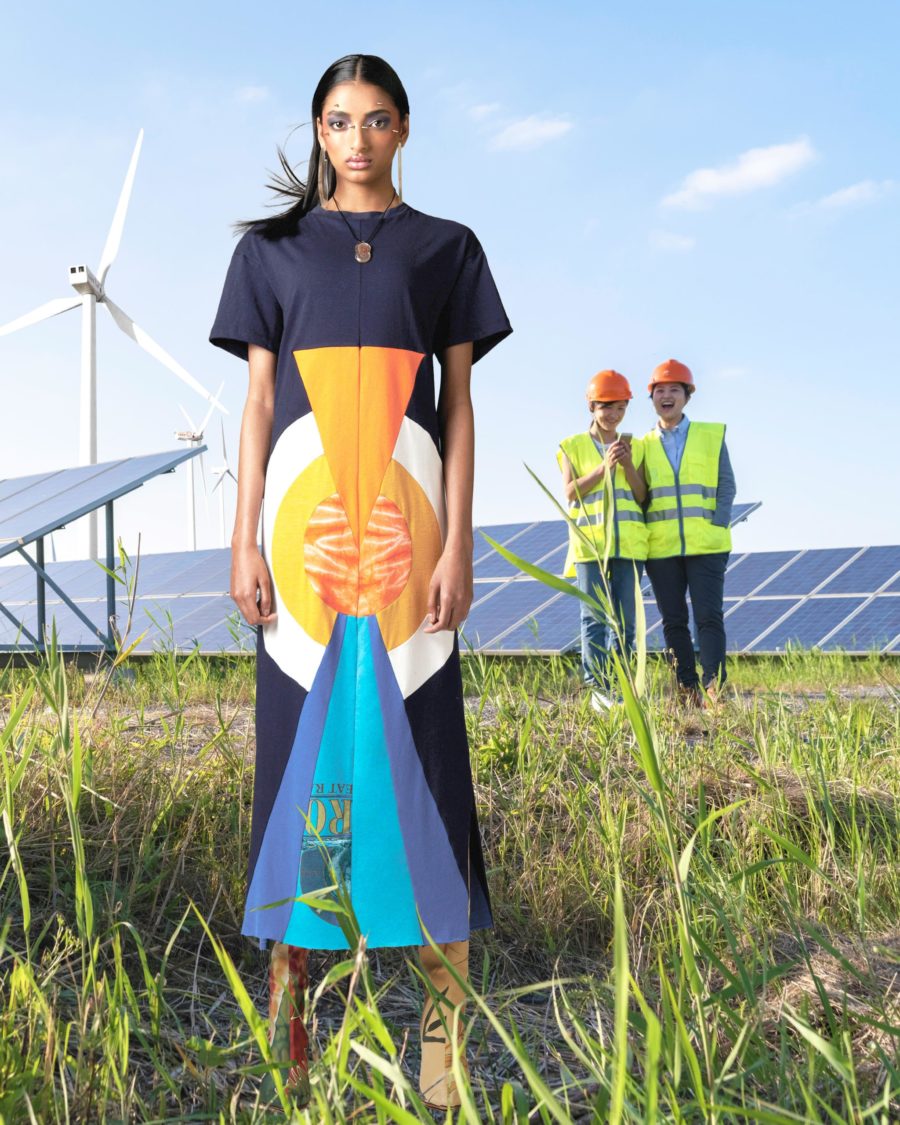
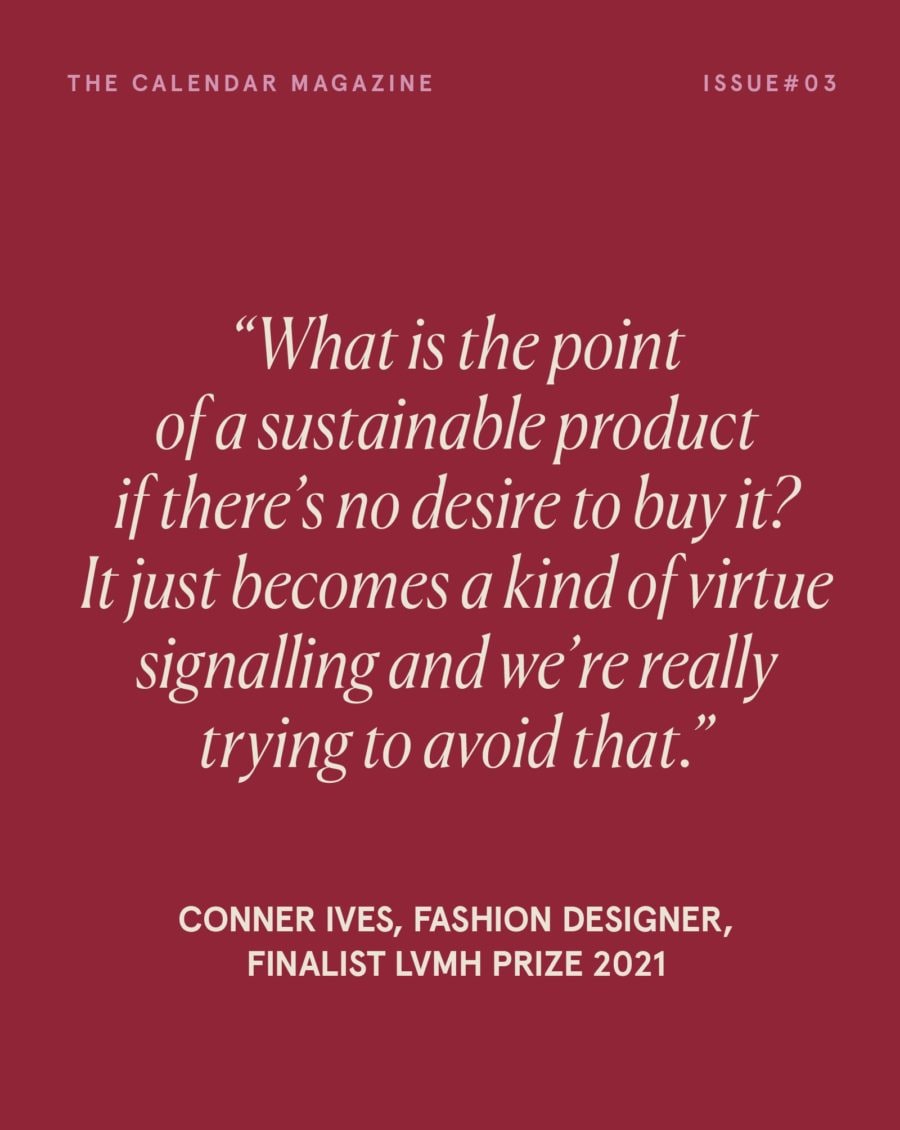
Designer Focus
Charting the timeline of Conner Ives’ career is a dizzying task; the American-born, London-based designer started his label in 2017 while in his first year at Central Saint Martins, posting his creations on Instagram in a Field of Dreams-inspired exercise (if you build it, they will come) just to see what would happen. A few months later he found himself dressing Adwoa Aboa in an incredible white swan-like sequinned dress for the Met Gala. Then, having been handpicked by Rihanna, he spent his third year working at her then top-secret label, Fenty, in Paris. Now, having graduated last summer, he’s just been named a finalist of this year’s LVMH prize.
You’d be mistaken, though, if you thought all this fast-tracked success translated into an ambition to take over the world; in fact, Ives is on a mission to quietly build a label that lasts, one that offers up beautiful, considered, truly desirable pieces inspired by the archetypal American women that he grew up with and iconic American sportswear. A self-confessed fashion geek, he has a deep appreciation for the process of creating clothes. “I love this concept of slow fashion and people that work tirelessly to realise something,” he says. So, with that in mind, he conjures one collection a year from his studio in Tottenham that spans ready-to-wear – cue much-coveted dresses made from spliced together, vintage-sourced t-shirts – and extraordinary demi-couture pieces that are intricately beaded or painstakingly, lovingly felted.
Ives estimates that around 75% of his clothes are made from deadstock, vintage or recycled material; as a teenager he had a stint interning for Wes Gordon and his mind was blown by the amount of luxury fabric that was discarded by the studio at the end of each season – and the realisation that every fashion house in the industry was doing the same. So, he resolved to work differently. He compares the much-loved cotton t-shirts that he sources to a leather Hermes bag; the way that they soften and get better and better with age. Just like him, they’re in it for the long haul.
Emma Sells, Calendar Fashion
Artwork: @siduations

Brand We Love
Co-founded by Para Hamilton and Shafiq Hassan – a top factory owner in Bangladesh – Ninety Percent was formed with a shared sentiment in mind: planet and people come before profit. The brand’s name communicates a message of altruism that carries through to its unique business model. Ninety Percent reserves, unsurprisingly, 90% of its profits for both the people that help put the collections together and a wide range of charitable causes – previous partners have included @warchildukand @biglifeafrica. The brand’s thoughtfully designed collection is filled with the kind of pared-back basics that underpin every exceptional wardrobe. Made with organic cotton, natural linen and plant-derived Tencel, Ninety Percent’s detail-focused, fuss-lite pieces will quickly make the deserved jump from sofa-only loungewear to versatile, wear-with-everything staples. Available from ninetypercent.com and @netaporter. HB.
Calendar Home
When covetable homeware meets bona fide environmental credentials, it makes for a compelling combination that we can’t help but fall in love with. From Canadian twin brother duo Byron and Dexter Peart comes an expertly-stocked marketplace that combines first-rate design with an impactful purpose. Having founded cult accessories label Want Les Essentiel in the mid-2000s, Byron and Dexter set their sights on a new challenge in 2019 and launched Goodee – a homeware consortium that brings together purposeful brands from around the globe.
A standout in Goodee’s ever-growing roster is lighting wizard ACdO. Diverting waste from landfill, ACdO crafts plastic waste into joyfully colourful woven lampshades, made by a community of Columbian artisans that have all been victims of guerilla warfare. Preserving heritage crafts, while channelling everyday waste into exquisite new creations? Now that’s the brand we want adorning our ceilings.
As well as curating an impressive lineup of independent brands, Goodee’s in-house collection of eco-sourced pieces is just as expertly designed as its contributors’. From handcrafted ceramics to effortless soft furnishings – each has full supply chain transparency, informed by the UN’s sustainable development goals. As a certified B Corp, and supporter of 1% For The Planet – the initiative that sees businesses donate 1% of every sale to environmental non-profits – Goodee’s sustainable credentials are indisputable. We don’t know about you, but we’re feeling in the mood for a spot of redecoration… HB.
Artwork by @gus_and_stella
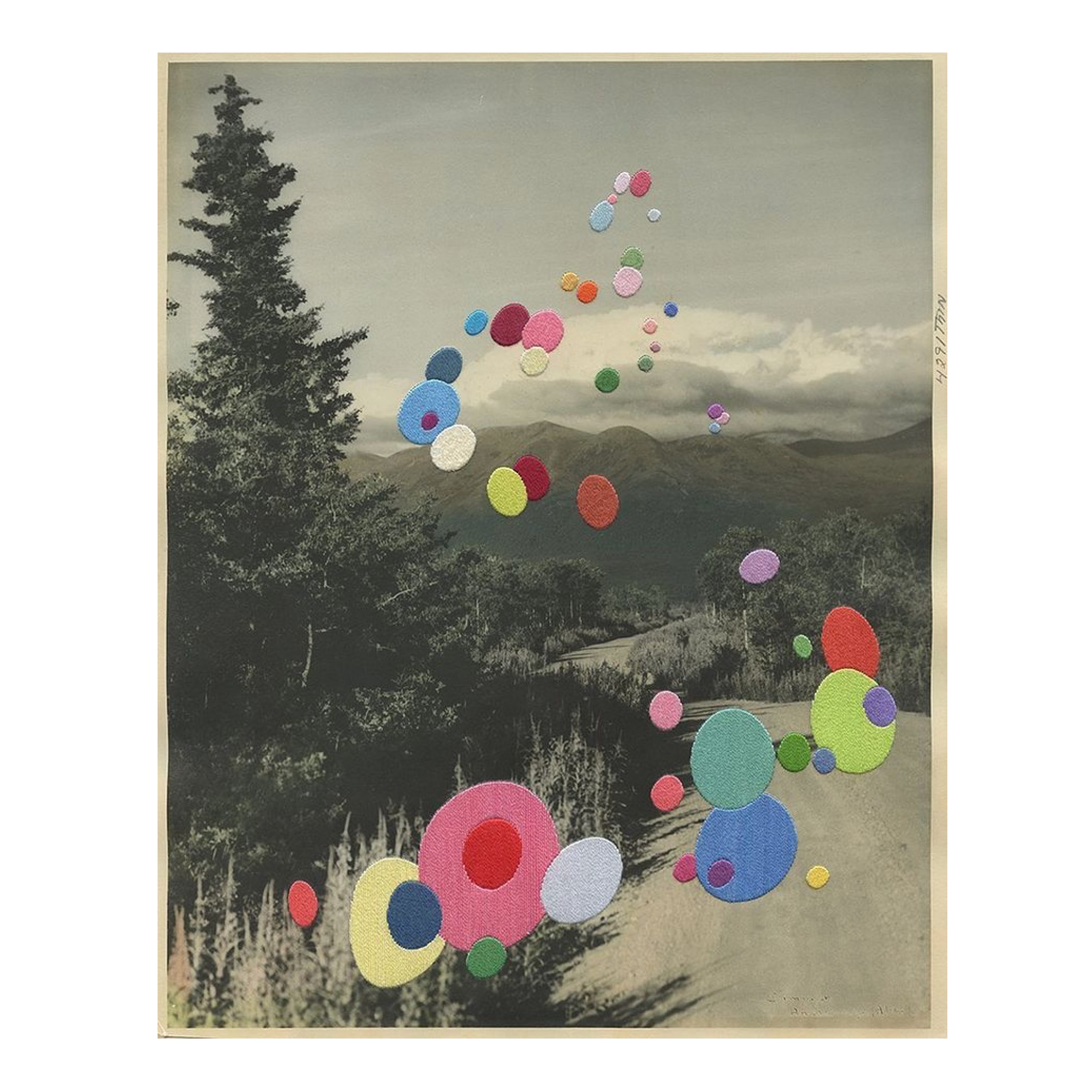
Be In The Now
Our Artist of the Month, as chosen by our Design Director Lisa Rahman, is Julie Cockburn (b. 1966), who is well known for reimagining second-hand objects or forgotten photographs with coloured dots or playful geometric shapes using embroidery and painted embellishments.
In the artwork pictured – titled ‘Ambling’, created in 2020 – the contrasting muted colours of the found image and pop of colour in the embroidered circles creates an entirely new narrative for the piece. What the process itself encourages is new ways of seeing, providing visual optimism on how to react to the ordinary or mundane. LR.
Artwork by @juliecockburnartist
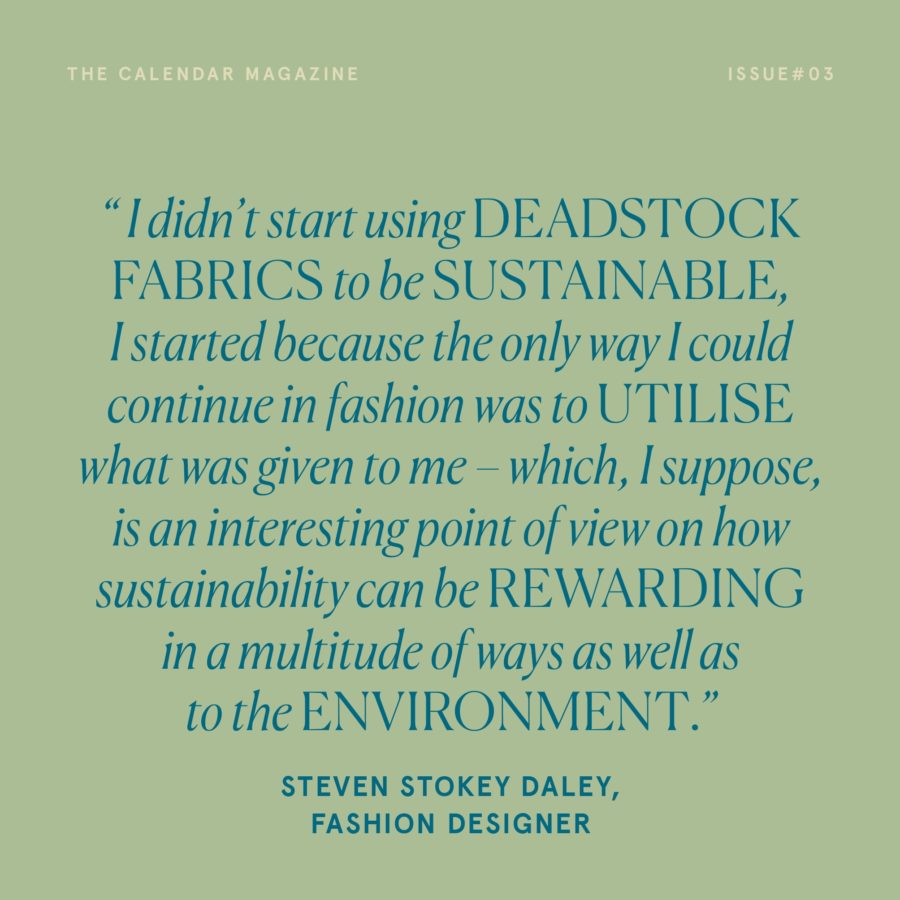
Spotlight On
Steven Stokey Daley is nothing if not resilient. The Liverpool-based designer only graduated last summer, in the midst of the pandemic, and has already managed to build a much-adored menswear label – and an adoring following – despite the chaos. His reach went global in October when – no big deal – stylist Harry Lambert, now a friend and mentor, dressed Harry Styles in a white shirt and wide-legged trousers from Daley’s graduate collection for the music video of ‘Golden’. Daley and his team had a week’s notice before the video’s release – just long enough to set up a pre-order system on his website that promptly sold out in minutes.
It’s easy to see why Daley’s clothes were a no-brainer on a Styles-centric mood board. The designer conjures irresistibly romantic, billowy pieces, all vintage floral prints mixed with heritage checks, that riff on the rarefied worlds of public school and Oxbridge and the beautiful, foppish youths that populate them. British theatre, literature and drama are constant touchstones, too.
The fact that his clothes are also sustainable, whipped up from deadstock fabric and vintage finds from tablecloths to curtains, is a happy accident. When he was in his final year at The University of Westminster, Sarah Burton donated rolls of beautiful deadstock fabric from the Alexander McQueen studios for his class to make use of. It was a lightbulb moment for Daley: not only did it give him a chance to use the kind of luxury fabrics that he simply couldn’t afford, but it also opened his eyes to the vast amount of waste discarded by labels and their studios. It’s now become an integral part of the label and, because building a responsible brand is about the people as much as the planet, he’s doing his bit to bring industry back to the north, too, enlisting the help of a tenacious band of local women to set up a production unit in Liverpool, where his clothes will be made and where he hopes to reignite a passion in people for sewing and craft.
Emma Sells, Calendar Fashion
Artwork: @gus_and_stella
Beauty Brand We Love
Covent Garden in the early ’80s was a dead zone with the ghost of the old fruit and veg market and a maze of mostly empty warehouses. But there was an alternative scene that made it worth the pilgrimage: Paul Smith on Floral Street; Flip and Paul Howie on Long Acre; PX on Endell Street; London’s leading vegetarian restaurant, Food for Thought, in an old banana-ripening warehouse on Neal Street; and then there was Neal’s Yard Remedies, named after its location. Only two of those businesses remain – Paul Smith and Neal’s Yard Remedies (NYR) and both are now global brands.
I used to buy essential oils, herbs for making tisanes, face creams and bath oils in lovely blue glass bottles from the old warehouse shop, tucked into a courtyard that was still redolent of the bustle of the old market. Natural health pioneer Romy Fraser was running the business, and though I had little knowledge of the distinction between natural and synthetic cosmetics, it felt good to be using locally made, plant-based products that had a positive effect on my skin and the planet. Today, those principles are the backbone of the responsible beauty movement, with much of the pioneering work having been done by NYR – it was the first skincare company in the UK to be certified by the Soil Association; has always been Cruelty-Free; was rated 100/100 for its ethics by The Ethical Company Organisation, and still manufactures in small batches in an eco factory in Dorset, where its organic herb gardens are located for grow all the ingredients.
I still buy NYR products: my favourite essential oils are Lavandin, £6,Ylang Ylang, £11, and Patchouli, £9.50; Women’s Balance Aromatherapy Blend, £15.50; Remedies to Roll Relaxation, £8, with a rollerball applicator; Frankincense Intense Age-Defying Cream, £55; Geranium and Orange Bath Oil, £15.
Today, Covent Garden may be indistinguishable from any other global retail hub, but if you head to Neal’s Yard and its courtyard of brightly painted warehouses, the enduring spirit of the brand lives on behind that blue door.

Love Forever
We’re delighted to welcome the fabulous Catherine Hayward, fashion director and consultant, as our May guest in our Love Forever series. Catherine is wearing her much cherished Alexander McQueen jacket circa 2004 and says:
“I bought this jacket in Milan back in 2004 with my first pay packet from Esquire. I’ve always loved the Alexander McQueen pagoda shoulder – it’s such a dramatic shape – yet what struck me the most when I tried it on was the deep comfort of the fit – you’d never know it was stretchy as it’s such a formal shape. I wear it a lot – especially when I want to feel confident. It’s all in the shoulders!”

Be In The Now
Thursday inspiration courtesy of Virginia Woolf.

Heirloom Piece
Designed with impeccable couture credentials and a sense of craftsmanship and ‘wear forever’ appeal, Sarah Burton’s creations for Alexander McQueen always feel like heirloom pieces to be cherished and passed on to the next generation. And this sunshine-yellow faille midi dress with a fitted bodice and circle skirt is one such piece. A modern study in classic 1950s elegance meets today’s effortless dress-up codes, with pleasing swish factor and decades of happy-making fashion memories guaranteed.
Pieced Midi Dress, £1990, available from alexandermcqueen.com
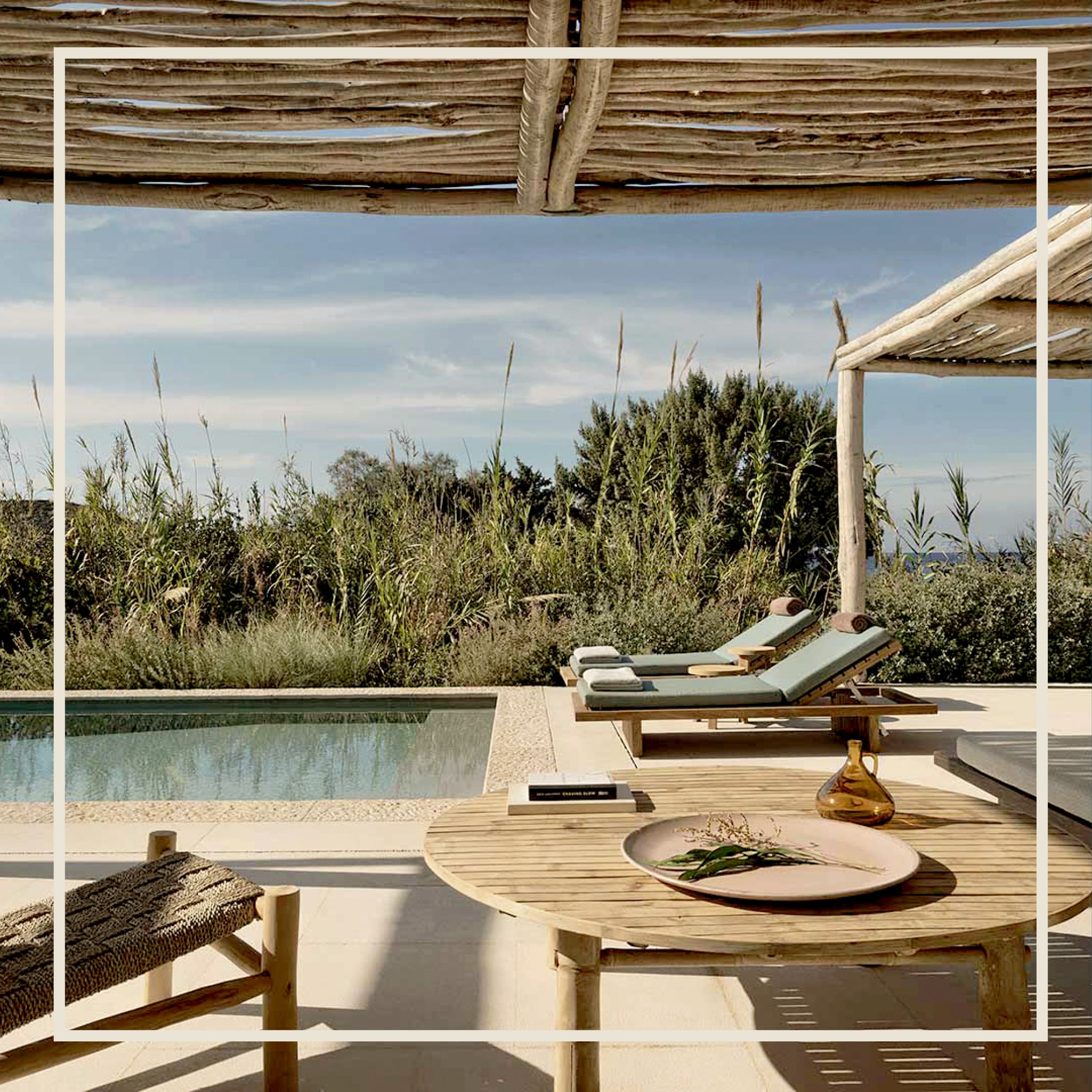

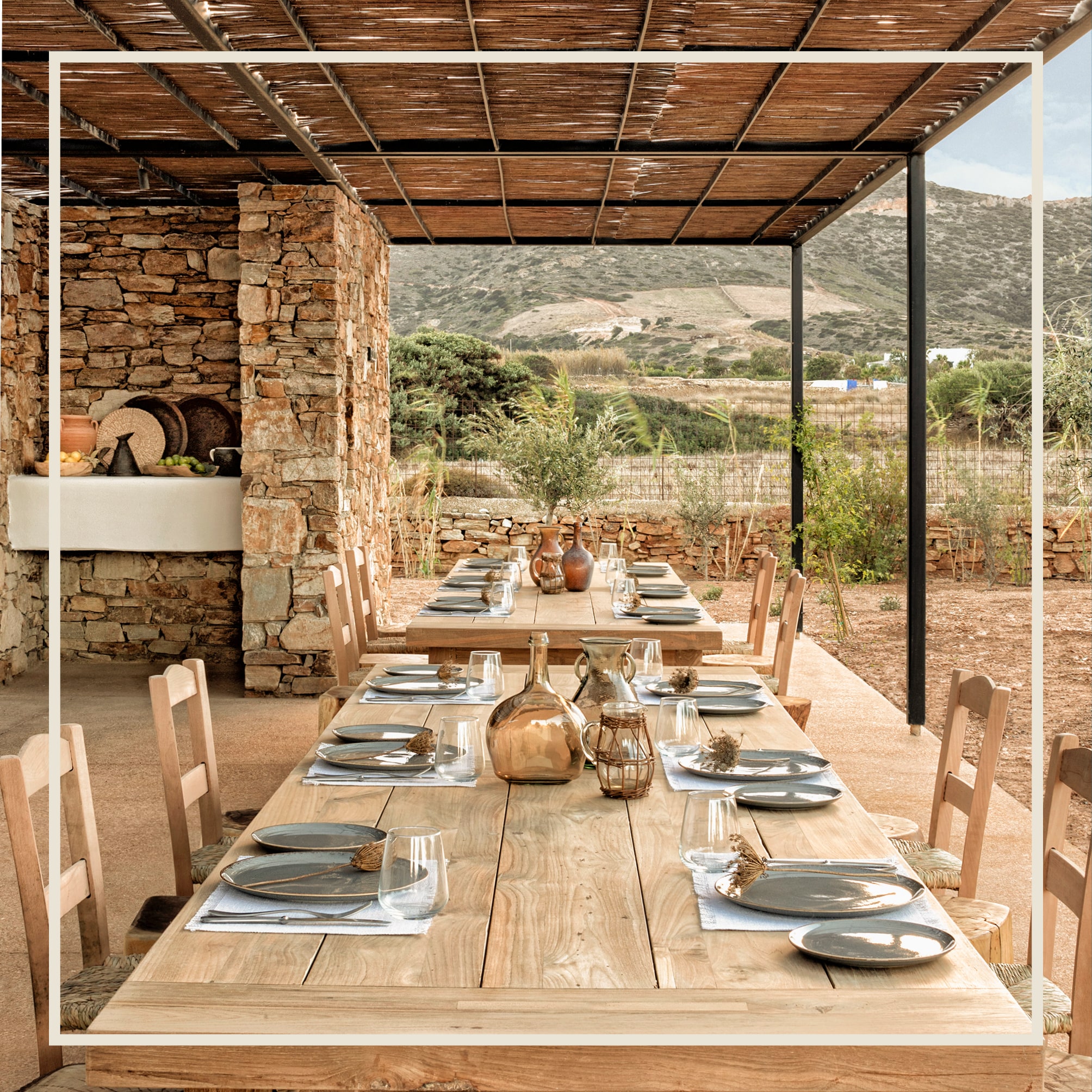
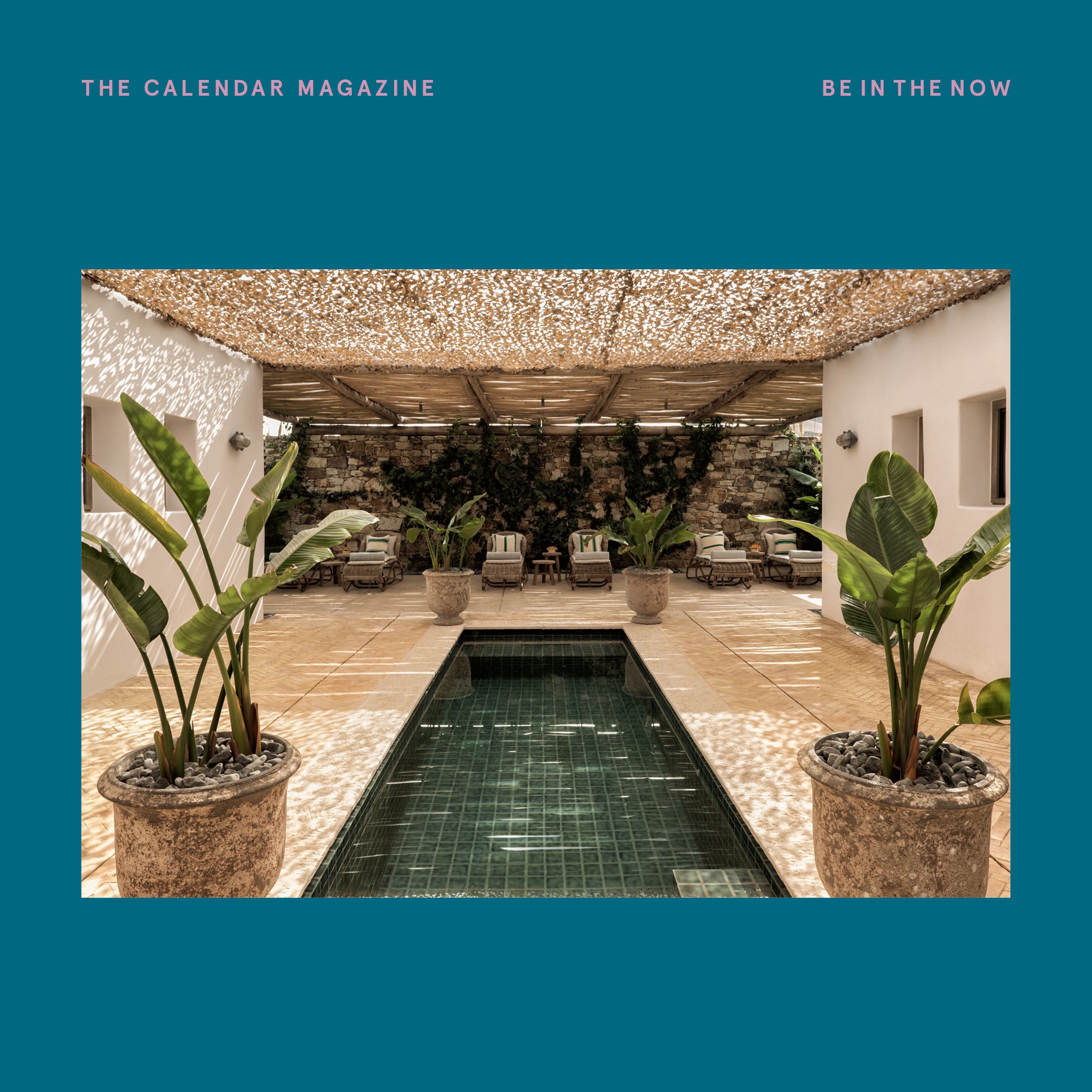
Calendar Travel
The Rooster, Antiparos
Green-list-wise, Greece looks like it could be a promising bet later on this summer, and right at the top of our wish list is the little Cycladic island of Antiparos, where the main town, Chora, was built around a Venetian castle. Just a 30-minute ferry-hop from the bigger island of Paros, Antiparos is all whitewashed houses with Klein Blue doors and shutters, café tables on cobbled streets, sandy beaches, and the famous cave where Lord Byron carved his name. Despite Tom Hanks and (allegedly) Madonna having houses here, it still has a chilled, slow travel, under-the-radar feel, and long-time Antiparos summer resident Athanasia Komninou (who had a former life in interiors magazines) wants to keep it that way. June 1st sees the opening of her passion project, The Rooster – a small wellness retreat with a spa, farm, and just 17 houses sleeping 2–6 (each with a private pool), that celebrates the art of organic living and respectful tourism.
VOIS architects helped her realise her minimalist, earthy aesthetic using sustainable wood and stone, sludgy colours and textures, rustic four-posters and artisan furniture. We can’t think of anything more restful than chilling in the holistic spa, with its rituals and sound healing, or heading to the Pavilion for complimentary yoga and meditation classes. Order homegrown food in the Restaurant (with vegetables and herbs you can pick yourself on the farm), or the fairy-lit Secret Garden, or book a Beach Basket filled with organic picnic treats when you’re heading for a swim and a snooze on Livadia beach.
If you’re after a party island, you are in the wrong place – but if you’re craving space, privacy, wholesome food and reconnecting with nature, you will love it.
Doubles from €580 B&B, theroosterantiparos.com
For slow travel to Greece, take the train to Athens (see seat61.com), then the ferry from Piraeus to Paros, and the smaller boat to Antiparos.
Calendar Home
One upside of lockdown life was that many of us got to slow down and explore our ‘crafty’ side. Whether it was learning to crochet or trying our hand at figure drawing, the idea of creative making and reaping the meditative benefits has been something of a revelation. And when Henry Holland, former Creative Director of House of Holland, decided to turn his hand to ceramic-making during lockdown, it led to something far bigger. While exploring ideas at his kitchen table, he stumbled across his own interpretation of the nerikomi pottery technique and the spark of an idea, resulting in his debut collection of table and serveware. Each object is unique, with the varied shades of different earthenware clays, creating Henry’s signature colour combinations and patterns. “It’s a privilege to design beautiful things that people are willing to live with,” says Holland. “To contribute to someone’s personal environment in this way, to be treasured, and to build treasured things, that’s the kind of connection we are all looking for.” We couldn’t agree more, Henry. Available from liberty.com

Object of Desire
When a Danish designer whose work is informed by a poetic, couture aesthetic and underscored with sustainable values joins forces with a heritage Spanish shoe brand steeped in traditional craftsmanship and artisanal design process, it’s pretty much a given that the results are going to be spectacular. Exhibit A: this ballet slipper designed by Cecilie Bahnsen in collaboration with Hereu. Available in five of Cecilie’s signature couture fabrics, including a cream version in upcycled plastic, it’s practically perfect in every way.
Hyacinth Shoes, €395, available from ceciliebahnsen.com and hereustudio.com

Beauty Brand We Love
BYBI (short for By Beauty Insiders) was founded by former ad industry execs Elsie Rutterford and Dominika Minarovic in 2017 on the back of their Clean Beauty Co. blog. With a ‘food for beauty’ purpose on the principle that what’s good enough for the inside has got to be good for the outside, the two segued from kitchen-table cosmetics recipes to full-on product formulation, scooping up a book deal with Penguin along the way.
The ever-evolving brand hasn’t forgotten its founding principles: stellar quality skin benefits that don’t come at a cost to the planet. To this end, BYBI’s internal audit – The Susty Score – grades all steps in the supply chain to determine environmental impact (the brand is currently carbon neutral and has offset all historic carbon emissions since founding, and is aiming for carbon negative status by 2025). Just a few examples of how this is achieved includes ingredients sourced close to home or shipped using low-carbon transport; upcycled ingredients (discarded strawberry seeds live another life as cold pressed seed oil in Strawberry Booster); packaging materials (sugarcane polyethylene) chosen with an eye on their afterlife, so less goes to landfill; and shipping boxes made from grass pulp that uses 80% less energy than paper from wood pulp.
But what about the actual products? Babe Balm, £18, perhaps the brand’s best-known multi-tasking vegan skin saviour, now comes in a Bronze tinted version, £12, for dewy highlighting. Clean Hands, £5.50, (a fast turnaround to meet pandemic demand, plus 3,000 units donated to Beauty Banks for the #HelpingHands campaign), features lavender and green tea to reduce redness and nourish over-sanitised hands. And the trending Bakuchiol Booster, £12, featuring an Ayurvedic and Traditional Chinese Medicine plant ingredient, a vegan plant-based alternative to retinol (vitamin A) for smoothing and brightening skin.
Anna-Marie Solowij, Calendar Beauty
Circular Fashion
If you baulk at the idea of second-hand shopping in person, it’s time to take your thrifting efforts online. According to founder Julie Wainwright, The RealReal is where Sotheby’s meets eBay. Started by Wainwright in 2011, it’s the consignment site that makes shopping for pre-loved, luxury pieces as simple and hassle-free as buying new. Stuffed to the brim with designer labels – from iconic houses such as Hermès and Chanel, to buzzy names like Ahluwalia and Rejina Pyo – it’s where scores of high-quality, second-hand gems gather under one (virtual) roof. Plus, key to The RealReal’s success is its authenticity promise, with each item individually verified by a team of experts.
Now, with its recently launched ReCollection, The RealReal has released its first line of signature pieces. A collaboration with fashion reimaginer Atelier & Repairs, each garment is made from upcycled designer pieces – accented with vintage fabrics, re-cut for an updated silhouette, or embellished with embroidery. Our standout? This Dries Van Noten jacket, resurrected from the label’s SS17 collection, with added patches and binding made from vintage quilts. It’s upcycling like we’ve never seen it before. HB





Take 5
Maggie Hewitt has spent the past year falling back in love with her label. True, the New Zealand-based designer and driving force behind Maggie Marilyn has been at the helm of her growing and much-loved brand for five years, but she grew to hate the hamster wheel of the fashion industry and the way that working with huge retailers enforced a focus on commercial success, rather than building a community of like-minded women with shared values. But Covid, and the enforced pause that it brought, gave her the space and courage to make audacious changes. No more wholesalers – instead, she’s selling direct to consumers, giving her complete control of how she engages with and educates the women who buy and cherish her clothes, as well as the freedom to make the label as circular and responsible as possible. It’s been a liberating experience.
Maggie Marilyn is now split into two: there’s Somewhere – a collection of the evergreen staples you’ll always want in your wardrobe, from track pants and jeans to wear-forever blazers, and that acts as an incubator for the brand’s most radical innovations. And then there’s Forever – capsules of the beautiful, more fashion-focused extras that Hewitt designs on an ad hoc basis whenever she feels inspired. The collections are smaller, the runs are limited and pieces often sell out. They’re designed to last, too, and are soon to be bolstered by a take-back service for the Somewhere pieces, all of which are able to be recycled or composted, and a free repair service for the Forever capsules.
Unchanged in all this upheaval is Hewitt’s staunch belief in the power of close relationships with the people she works with – the vast majority of her pieces are made in New Zealand and all factories are within a 20-minute radius of her Auckland studio. The reset hasn’t dimmed her ambitions either; with plans to be carbon neutral, use natural fibres from regenerative farms and own the life cycle of every piece she creates, Hewitt is hoping that the bigger the label grows, the more people it will empower and uplift.
Emma Sells, Calendar Fashion

Brand We Love
As lockdown eases, and we begin to reacclimatise to a world of social engagements, we’re on the hunt for a new breed of everyday staple. Gone is the loungewear – at least while we’re out of the house. Now, it’s versatile, easy-to-wear, and ever so slightly structured pieces that we’re reaching for. Founders Deborah Sams and Mary Lou Ryan established Bassike in 2006. The vision? Create a framework of garments that slot seamlessly into every kind of wardrobe. Think: classic tailoring, bold yet cleverly detailed dresses, and wear-forever trousers that are as effortlessly polished as they are comfortable. Much of the collection is made in Australia, where the brand is based, and uses organically grown, locally dyed cotton – up to 46% less emission-intensive than its conventional counterpart. With a business model that supports local charities, the brand’s timeless pieces marry sleek design with a compassionate approach that makes for enduring, feel-good classics. Available from bassike.com and @selfridges. HB.
Be In The Now
This month, our resident gardening expert Stina Hasan talks dahlias, deadheading roses and how to direct sow your flowers with style.
May gardening jobs…
Plant out dahlias
In mid to late May, when the risk of frost has passed, it is time to plant out dahlias. Dig a big hole and add a few handfuls of peat-free compost before planting. Put some sturdy stakes in now before the plants put on too much growth – their large flower heads are quite heavy, so these beauties need some support.
Deadheading roses
The first flush of roses in May is a real highlight of the gardening year. To keep them flowering, it is important to deadhead roses regularly. Snip off fading blooms as the petals begin to fall and you will encourage new growth and more flowers to come. Ideally this should be done daily – that might sound tedious but, to me, it is a really enjoyable evening ritual. To spend some time outside at dusk, when the heady scent of roses mingling with my neighbour’s honeysuckle is at its most potent, is a real treat, and I always want to stay in the garden just a little bit longer.
Direct sow flowers
By May, the soil will be warm enough to sow flower seeds direct in the place where you want them to grow. California poppies, calendula, cosmos, poppies and nasturtiums all grow really quickly if you sow them in a sunny spot and keep them watered during dry spells. To watch a patch of bare soil turn lush and green and full of flowers in just a few months is pure magic.
Stina Hasan
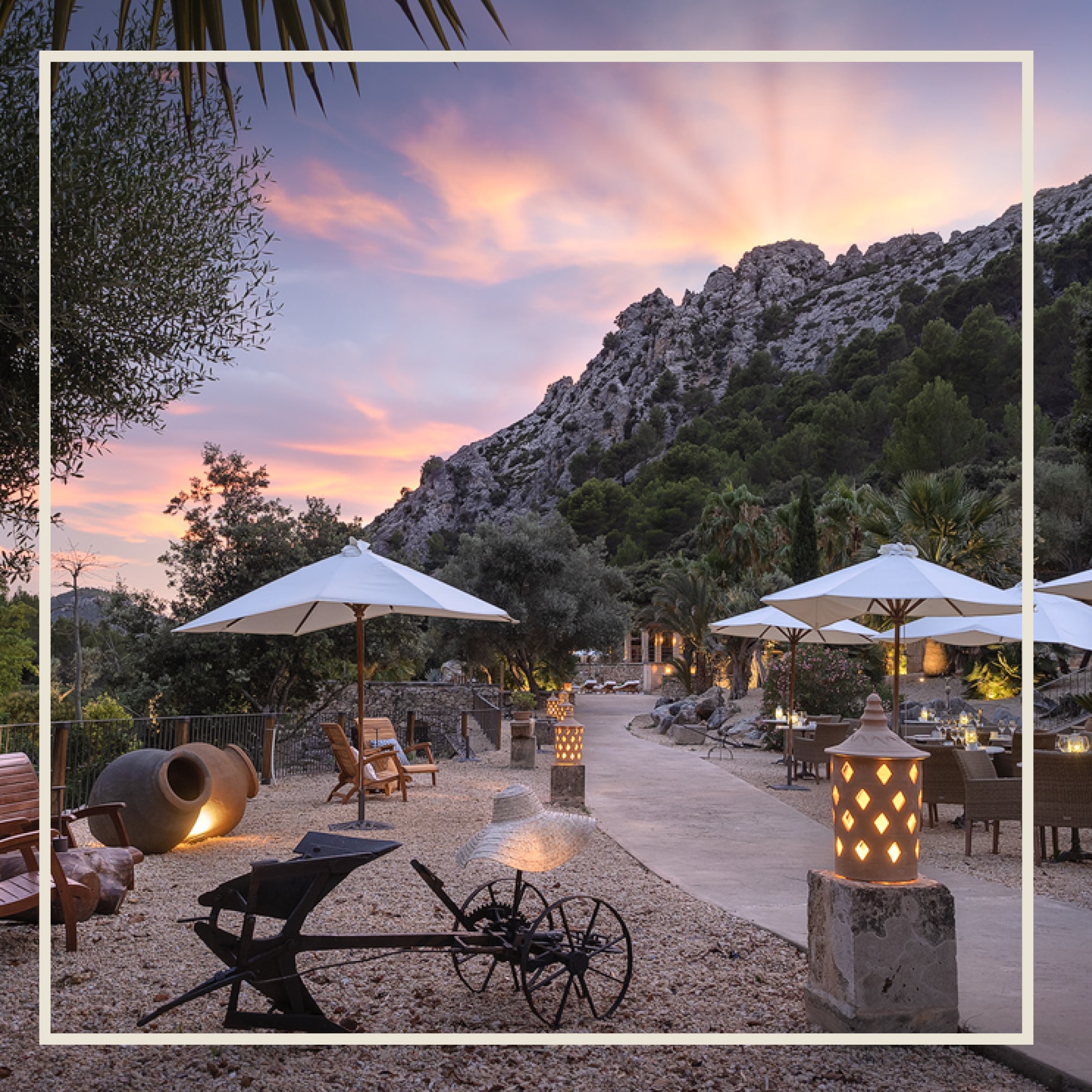
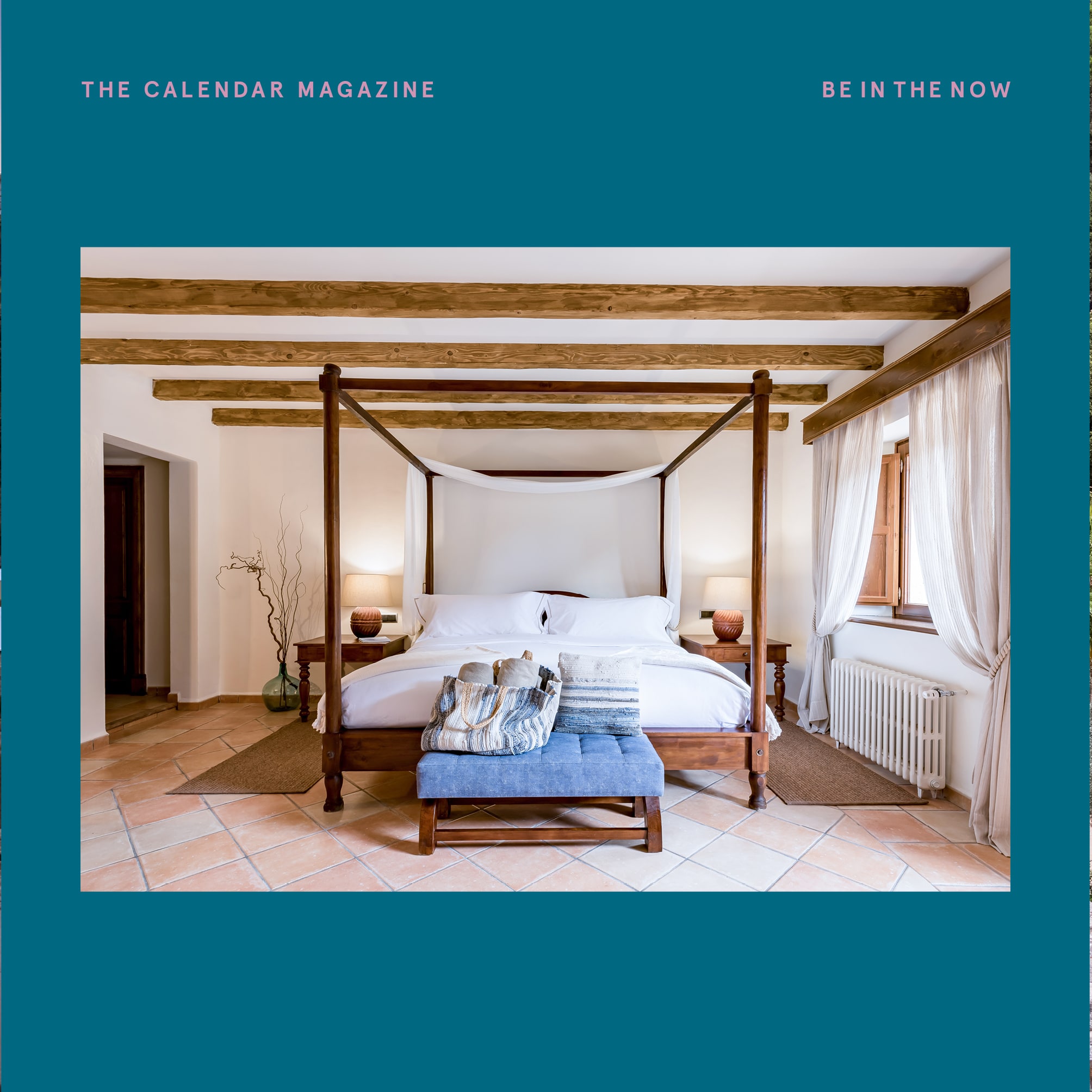
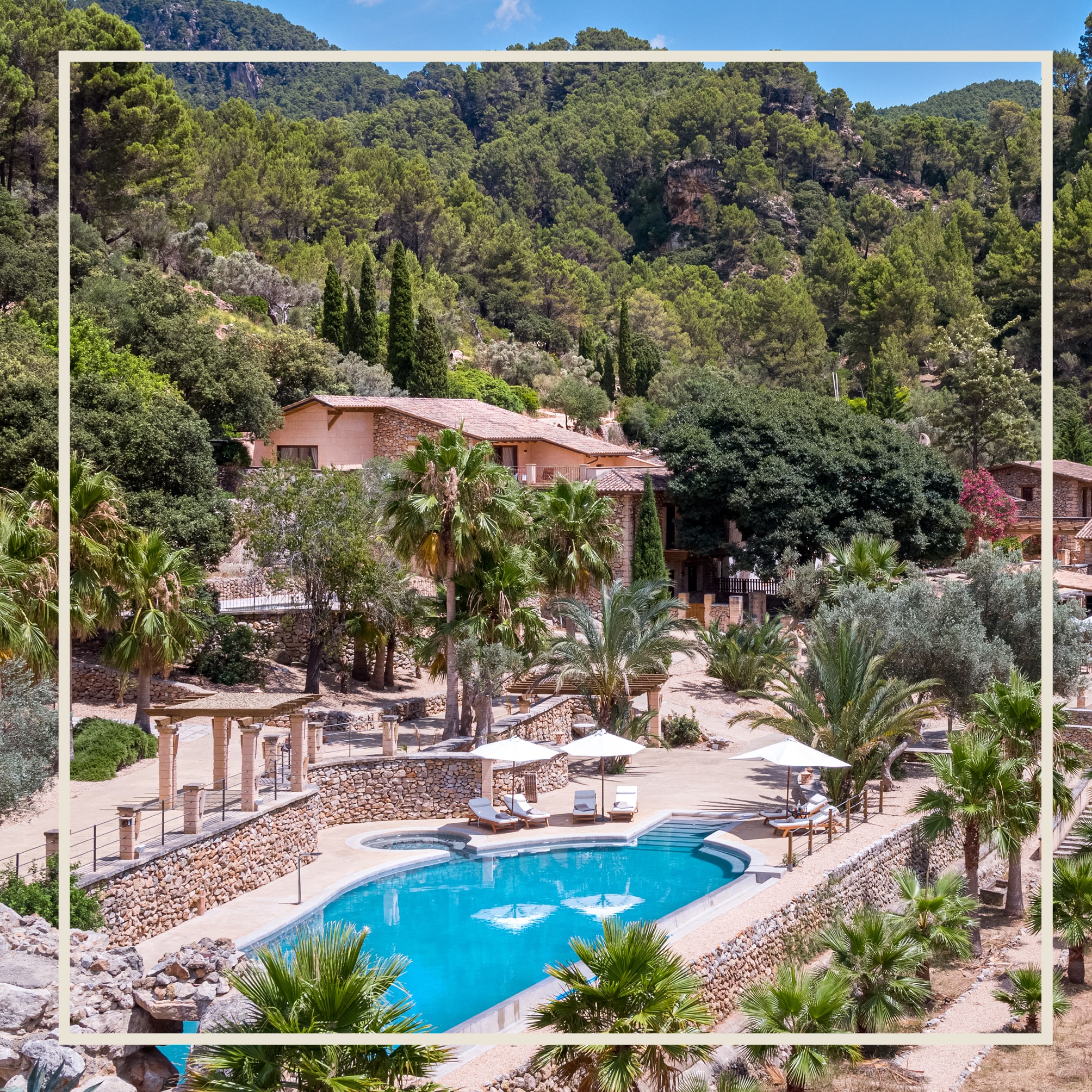

Calendar Travel
The Tramuntana mountains, a UNESCO World Heritage Site, cross Mallorca from north east to south west, a spectacular, 90km area of deep canyons, monasteries, little villages, vineyards, almond orchards and ancient churches. High up on the rugged slopes, 20km west of Palma, you’ll find LJs Ratxo – a new luxury eco-retreat that opened on May 14. Set among olive groves and palm trees, with wild goats roaming nearby, the building that houses the 25 rooms is built of local sandy-coloured stone. Interiors are rustic luxe – all neutral tones, wooden beamed ceilings, four-poster beds, soft linens and pale terracotta tiled floors. Each room has a private terrace and jacuzzi, and the two fanciest (the Suite and the Royal Suite) have a private plunge pool. Organic food for the restaurant is grown in the orchard and garden, and the spa uses organic and cruelty-free produce. Hiking trails up into mountains start from the hotel, and if you want the beach, you’re just two miles from the pretty curved bay of Playa de Palmira.
As well as the beauty of LJs Ratxo’s setting, one of the many things that impresses is the sustainability charter on their website, which details the eco-measures they have already taken (reverse osmosis drinking water system, no plastic, local community collaboration, zero-kilometer food …), and what they are working on (renewable energy system; food-waste recycling system) to reach their ultimate goal to be fully sustainable. It is not always possible to be completely carbon neutral from the off, but to set out your intentions when you launch means everyone knows what they are buying into.
Doubles from €220, including all-day breakfast
Carbon offsetting: co2.myclimate.org has a user-friendly carbon-offsetting calculator that lets you work out how much you should contribute, and choose which projects to fund.

Be In The Now
Happy Bank Holiday – we’re signing off our May issue with this inspiring quote from Albert Einstein. It’s all about looking at things in a new way and fashioning the future together.